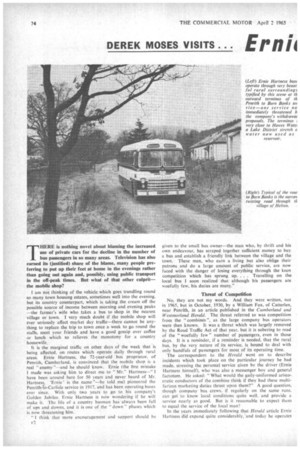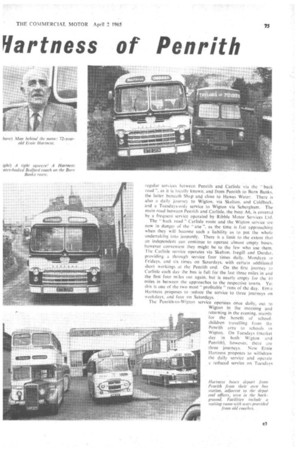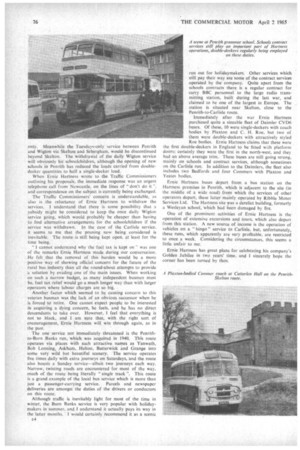DEREK MOSES VISITS. .• Ernii
Page 76

Page 77

Page 78

If you've noticed an error in this article please click here to report it so we can fix it.
Vartness of Penrith
THERE is nothing novel about blaming the increased. use of private cars for the decline in the number of
bus passengers in so many areas. Television has also earned its (justified) share of the blame, many people preferring to put up their feet at home in the evenings rather than going out again and, possibly, using public transport in the off-peak times. But what of that other culprit— the mobile shop?
I am not thinking of the vehicle which goes trundling round so many town housing estates, sometimes well into the evening. but its country counterpart, which is taking the cream off the possible source of income between morning and evening peaks —the farmer's wife who takes a bus to shop in the nearest village or town. I very much doubt if the mobile shop will ever seriously affect market day traffic—there cannot be anything to replace the trip to town once a week to go round the stalls, meet your friends and have a good gossip over coffee or lunch which so relieves the monotony for a country
housewife. .
It is the marginal traffic on other days of the week that is being affected, on routes which operate daily through rural areas. Ernie Hartness. the 72-year-old bus proprietor. of Penrith, Cumberland, is convinced that the mobile shop is a real "enemy "—and he should know. Ernie (the first mistake I made was asking him to direct me to " Mr." Hartness--" I have been around here for 50 years and never heard of Mr. Hartness. 'Ernie' is the name "—he told me) pioneered the Penrith-to-Carlisle service in 1917, and has been operating buses ever since. With only two years to go to his company's Golden Jubilee. Ernie Hartness is no-w wondering if he will make it. The life of a country busman has always been full of ups and downs, and it is one of the " down " phases which is now threatening him.
" I think that more encouragement and support should be rl given to the small bus owner—the man who, by thrift and his own endeavour, has scraped together sufficient money to buy a bus and establish a friendly link between the village and the town, These men, who earn a living but also oblige their patrons and do a large amount of public service, are now faced with the danger of losing everything through the keen competition which has sprung up. . . Travelling on the local bus I soon realized that although his passengers are woefully few, his duties are many."
Threat of Competition
No, they are not my words. And they were written, not in 1965, but in October. 1930, by a William Fox, of Catterlen, near Penrith, in an article published in the Cumberland and Westmorland Herald. The threat referred to was competition from the " combines", as the large company bus operators were then known. It was a threat which was largely removed by the Road Traffic Act of that year, but it is sobering to read of the "woefully few" number of passengers, even in those days. It is a reminder, if a reminder is needed, that the rural bus, by the very nature of its service, is bound to deal with only handfuls of passengers for most of its operating time.
The correspondent to the Herald went on to describe incidents which took place on the particular journey he had made. stressing the personal service given by the driver (Ernie Hartness himself), who was also a messenger boy and general factotum. He asked: "What would the gaily-uniformed aristocratic conductors of the combine think if they had these multifarious marketing duties thrust upon them?" A good question, though company bus crews, if regularly on the same runs, can get to know local conditions quite well, and provide a service nearly as good. But is it reasonable to expect them to equal the service of the local man?
In the years immediately following that Herald article Ernie Hartness did expand quite considerably, and today he operates cegular services between Penrith and .Carlisle via the back
road ", as k is locally known, and from Penrith.to Burn Banks, the latter beneath Ship and close to Hawes Water. There is
• also a daily journey to Wigton, via Skelton, and Caldbeck, and a Tuesdays-only service to Wigton via Sebergham, The main road between Penrith and Carlisle, the busy Afi, is covered by a frequent service operated by Ribble Motor Services Ltd.
The back road " Carlisle route and the Wigton service are now in danger of the " axe". as the time is fast approaching when they will become such a liability as to put the whole undertaking into jeopardy. There is a limit to the extent that an independent can continue to operate almost empty buses. however convenient they might be to the few who use them. The Carlisle service operates via Skelton. lvegill and Durdar, providing a through service four times daily. Mondays. io Fridays. and six times on Saturdays: with certain additional short workings at the Penrith end. On the first journey to Carlisle each day the bus is full for the fast three miles in and the first four miles out again, but is nearly. empty for the 10 miles in between the approaches to the respective towns. Yet this is one of ihe iwo most " profitable" runs of th day. Ernie Hartness proposes to i.educe the service to three journeys on weekdays, and four on Saturdays.
The Penrith-to-Wigton serviee operates 'Once daily, out to Wigton in the morning and returning in the evening, mainly for the benefit of schoolchildren. travelling from the Penrith area to schools in Wigton. On Tuesdays (market day in both Wigton and Penrith), • however, there are three journeys. Now Ernie Ffartness proposes to withdraw the daily service and operate i.educed service on Tuesdays
only. Meanwhile the Tuesdays-only service between Penrith and Wigton via Skelton and Sebergham, would be discontinued beyond Skelton. The withdrawal of the daily Wigton service will obviously hit schoolchildren, although the opening of new schools in Penrith has reduced the loads carried from doubledecker quantities to half a single-decker load. When Ernie Hartness wrote to the Traffic Commissioners outlining his proposals, the immediate response was an urgent telephone call from Newcastle, on the lines of "don't do it ". and correspondence on the subject is currently being exchanged.
The Traffic Commissioners' concern is understandable, as also is the reluctance of Ernie Hartness to withdraw the services. I understand that there is some possibility that a subsidy might be considered to keep the once daily Wigton service going, which would probably be cheaper than having to find alternative arrangements for the schoolchildren if the service was withdrawn. In the case of the Carlisle service. it seems to me that the pruning now being considered is inevitable. The route is still being kept open, at least for the time being.
"I cannot understand why the fuel tax is kept on " was one of the remarks Ernie Hartness made during our conversation. He felt that the removal of this burden would be a more 'positive way of showing official concern for the future of the rural bus industry than all the round-about attempts to provide a solution by evading one of the main issues. When working on such a narrow budget, as many independent busmen must be, fuel tax relief would go a much longer way than with larger operators where labour charges are so big.
Another factor which seemed to be causing concern to this veteran busman was the lack of an obvious successor when he is forced to retire. One cannot expect people to be interested in acquiring a dying concern, he feels, and he has no direct descendants to take over. However, I feel that everything is not so black, and 1 am sure that, with the right sort of encouragement, Ernie Hartness will win through again, as in the past.
The one service not immediately threatened is the Penrithto-Burn Banks run, which was acquired in 1940. This route operates via places with such attractive names as Yanwath, Bob Lonning, Askham, Helton, Butterwick and Grange into some very wild but beautiful scenery. The service operates five times daily with extra journeys on Saturdays, nd the route also boasts a Sunday service—albeit two journeys each way. Narrow, twisting roads are encountered for most of the way, much of the route being literally "single track ". This route is a grand example of the local bus service which is more than just a passenger-carrying service. Parcels and newspaper deliveries are amongst the duties of the drivers or conductors on this route.
Although traffic is inevitably light for most of the time in winter, the Burn Banks service is very popular with holidaymakers in summer, and 1 understand it actually pays its way in the latter months. I would certainly recommend it as a scenic E4 run out for holidaymakers. Other services which still pay their way are some of the contract services operated by the company. Quite apart from the schools contracts there is a regular contract for carry BBC personnel to the large radio transmitting station, built during the last war, and claimed to he one of the largest in Europe. The station is situated near Skelton, close to the Penrith-to-Carlisle route.
Immediately after the war Ernie Hartness purchased quite a sizeable fleet of Daimler CVD6 buses. Of these, 10 were single-deckers with coach bodies by Plaxton and C. H. Roe, but two of them were double-deckers with attractively styled Roe bodies. Ernie Hartness claims that these were the first double-deckers in England to be fitted with platform doors: certainly they were the first in the north-west, and they had an above average trim. These buses are still going strong, mainly on schools and contract services, although sometimes on the Carlisle run. In addition to the Daimlers, the fleet also includes two Bedfords and four Commers with Plaxton and Yeates bodies.
Ernie Hartness buses depart from a bus station on the Hartness premises in Penrith, which is adjacent to the site (in the middle of a wide road) from which the services of other operators depart, these latter mainly operated by Ribble Motor Services Ltd. The Hartness site was a derelict building, formerly a Wesleyan school, 'which had been damaged by lire.
One of the prominent activities of Ernie Hartness is the operation of extensive excursions and tours, which also depart from this station. A new source of income is the operation of vehicles on a 'bingo" service to Carlisle, but, unfortunately, these runs, which apparently are very profitable, are restricted to once a week. Considering the circumstances, this seems a little unfair to me.
Ernie Hartness has great plans for celebrating his company's Golden Jubilee in two years' time, and I sincerely hope the corner has been turned by then.


































































































































































